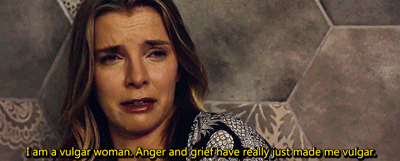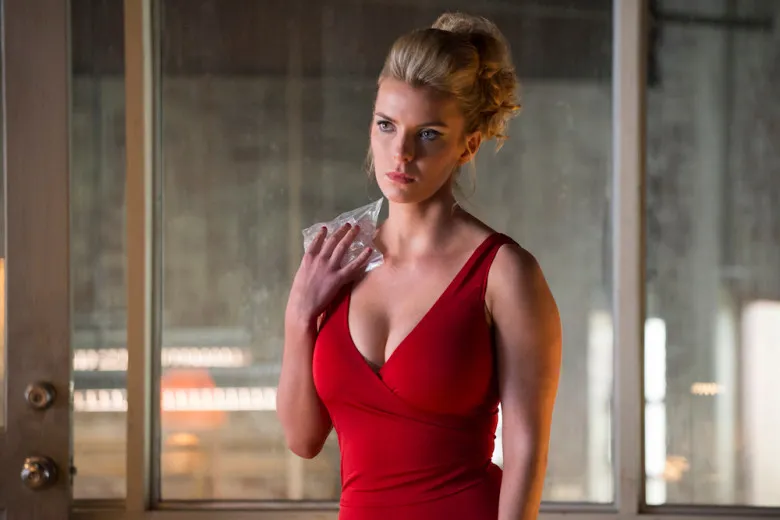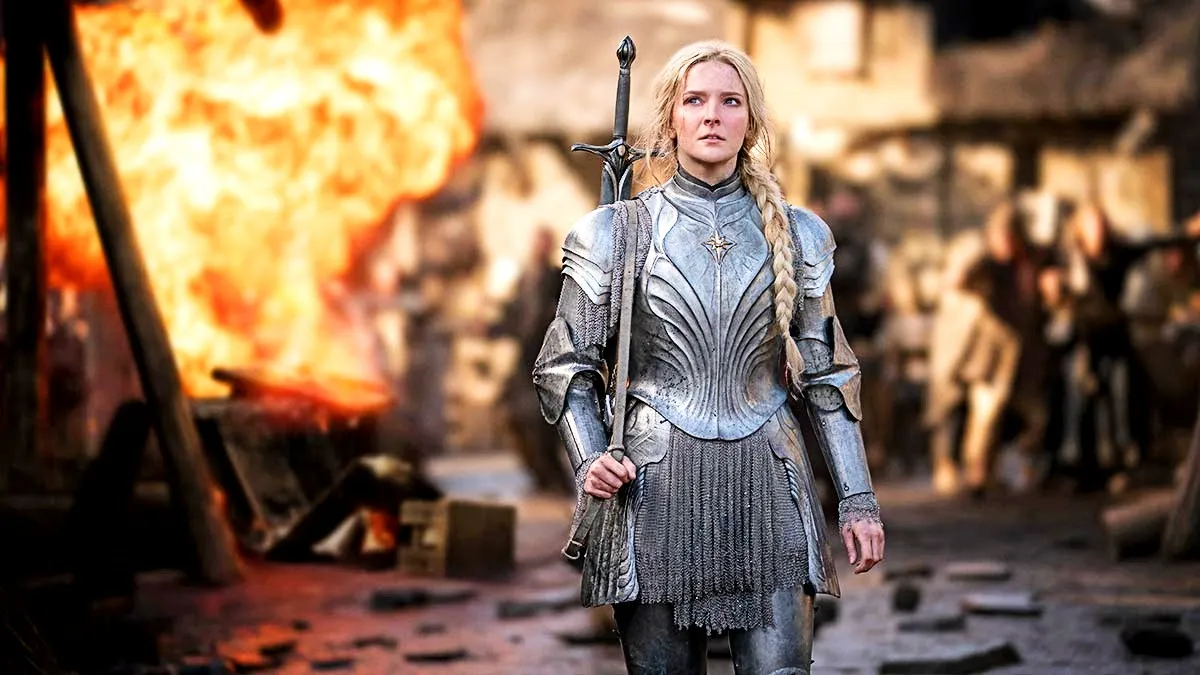Actress Betty Gilpin, a recent breakout for roles in GLOW and American Gods, has a personal essay about her body in Glamour magazine that had me alternately smiling, sighing, laughing, and wanting to applaud (I’m typing this instead).
Gilpin is hardly new to acting—you might recognize her first for playing Doctor Carrie Roman on Nurse Jackie (she’s also had guest spots on Fringe and Elementary)–but 2017 seems to be shaping up to be her year. From the moment on American Gods that Gilpin’s Audrey saw her dead best friend-turned-undead Laura Moon hanging around in her house, I became a Betty Gilpin devotee. Audrey’s terrified screaming meltdown that melts into angry grief and eventually the will to help Laura despite what passed between them was a masterpiece of a scene. This was Gilpin’s moment.

(image: Starz)
Now she has a starring role as Liberty Belle alongside Alison Brie in the lady-wrestling Netflix series GLOW. In an essay about the experience of landing and shooting the GLOW part, which was the first female-run show Gilpin worked on, she writes about her body and sense of self-worth with frank and hilarious honesty that made me frantically type “THIS IS SO BEAUTIFUL OMG” in our Mary Sue chat. You really have to read the whole thing, but I can’t help myself from excerpting some of my favorite parts so that they can live here on our site forever.
On being an awkward, self-loathing adolescent:
“I don’t know when it was, but at some point I realized the obvious truth that I was a hideous goblin under a bridge, that the sound of my voice was like audible feces, and the presence of my body in a room was like bringing a moose carcass to brunch. I adopted the posture that Katie Holmes had as Joey in Dawson’s Creek: shoulders as high to one’s ears as possible, as if I could shrug my existence away. (To this day, I legitimately blame Dawson’s for my back problems.)”
On puberty and what comes with suddenly filling out a “Jessica Rabbit” body, including the experience of what it’s like to have large breasts, well, pretty much anywhere in the world:
“And then puberty was like, WA-BAM. Physically, I went from Justin Bieber to Jessica Rabbit. I gained 30 pounds of thigh, booty, and certified American jugs. And I quickly learned big boobs have the effect of announcing your presence in a room as if you’re cradling Gilbert Godfrey singing the opening to the ‘Circle of Life.'”
On “sorry,” which becomes a default for many women (I’ve said “sorry” when other people bump into me on the street; “sorry” when stepping out of an elevator; “sorry” when moving to take up nearly any space vacated by someone else; sorry, sorry, sorry)
“So in my 20s, I had to work doubly hard to disappear. The word “sorry” escaped my mouth a hundred times a day. I spent most of my time at parties trying to convince women that I hated myself, then had social hangovers about those conversations.”
On acting outside of herself.
“I became an actor who auditioned to play women who say things like, ‘Does this look like mauve to you?!’ Women who look in the mirror and see something beautiful. A nightmare for the terrified tiny person trapped beneath the blonde and boobs.”
Gilpin gives an incredible account of the intense process the GLOW actors underwent to appear as convincing wrestlers. This became a transformative and empowering experience:
“When my bicep I spent my entire twenties hating circled her neck, she screamed to the sky in faux-pain, as if I were the most powerful being who had ever touched her. I pressed my huge boobs into her back to “worsen” the pain, and she begged for mercy between death-gasps. For the first time in my life, I could feel my whole body listening. Go here. Come here. Be still. Take charge. Now one, two, three, fly. … We were all mermaids with muscle.”
Gilpin calls the experience of working and training with so many women “Studio 54 in 1600s Salem, Massachusetts, maybe,” which I adore. And then she describes what sounds like an enchanted on-set experience: “Glow was the first set I’d been on run by women. It was a magical never-never land run by type-A amazons. I saw power and care together for the first time. Seeing women possess those two things simultaneously was a huge lesson for me. …
[GLOW] Creators Liz Flahive and Carly Mensch commanded our set with a greater authority than any of the bro-gargoyles of yore, but with open arms, back rubs, and eye contact. This created the constant sense of: You are loved and celebrated—and now that you’re comfortable, please give us your goddamn guts and soul so we can make the best thing possible. Also, have this Philly cheesesteak for God’s sake.”
Do you love Betty Gilpin now as much as I love Betty Gilpin now? If so be sure to click and bask in the full, funny, and furious force of her Glamour article below. She’s as damn fine a writer as she is an actress, and I’d like to thank her for writing her truths so openly. We don’t often talk about what it’s like to both want to disappear and at the same time appearing so visible to the outside world. I also suddenly have a strong desire to take up women’s wrestling. Who wants to train with me?
(via Glamour, image: Netflix)
Want more stories like this? Become a subscriber and support the site!
—The Mary Sue has a strict comment policy that forbids, but is not limited to, personal insults toward anyone, hate speech, and trolling.—










Published: Jun 27, 2017 02:32 pm